MULTIFORUM Anticipation and Futures Literacy
Latin America and the Caribbean – November 17th-30th, 2021
PRESENTATION
Exploring and Expanding Alternatives. Using the future in a literate way to overcome “poverty of imagination”.
Latin America and the Caribbean – November 17-30, 2021
The UNESCO Chair in Anticipation and Resilience at the South American Institute for Resilience and Sustainability Studies (SARAS, Uruguay) convenes the Latin American and the Caribbean (LAC) community to the first Anticipation and Futures Literacy Multiforum.
This initiative is part of a process led by UNESCO since 2012 to overcome “poverty of imagination”. In continuity with the Global Futures Literacy Design Forum held in Paris in December 2019 and the Global Futures Literacy Summit in 2020, the Multiforum Latin America and the Caribbean 2021 seeks to:
- Enhance the connections, knowledge sharing, and joint undertakings that connect the Global Futures Literacy Network with communities in LAC that are engaged in exploring and enhancing human anticipatory activities.
- Present the Spanish translation of the book “Transforming the Future. Anticipation in the XXI Century”, a collective publication edited by Riel Miller / UNESCO in English originally in 2018 and now published in Spanish in a joint effort by UNESCO-Universidad del Externado-SARAS.
- Contribute to disseminating the importance of Future Literacy as a key skill for the 21st century.
- Share practical experiences in LAC and around the world that demonstrate the value of conducting research, teaching, and community engagement to cultivate humanity’s capacity to imagine the future.
What is Futures Literacy?
FL is a capability, a capacity and competence that enables people to better understand the role of the future in what they ‘see’, think, and do in the present. Being literate in the ‘use of the future’ strengthens the imagination, improves our ability to prepare, plan, sense and make sense of the present as a complex emergent reality that consists of repetition and difference, continuity, and novelty.
The term Futures Literacy mimics the idea of literacy in reading and writing because it is a skill that is available to everyone. People can become more literate and more adept at ‘using the future’ due to two facts: first, the future does not exist yet, it can only be imagined; and second, anticipatory systems are fundamental to all living organisms, humans deploy the power of their imagination, reflective thinking, learning, and resilient capacities. This means that futures literacy is about empowering people to imagine the future for different reasons and in different ways, and thereby significantly enhancing the capacity to perceive and act in a complex universe.
It’s important to note that being literate in the ‘use of the future is not about making better predictions, but about understanding why and how anticipatory assumptions influence what and how we see the present, influencing the decisions we make today and the nature of humanity’s relationship to open, non-deterministic futures.
With the Futures Literacy initiative, UNESCO has been facilitating innovative collective intelligence knowledge creation processes to overcome “poverty of imagination”. One of the ways is through experimenting with the diversification of ‘the uses of the future’ in Futures Literacy Labs for Novelty (FLL-N), going beyond preparation and planning, placing special emphasis on making a new sense of emergent reality.
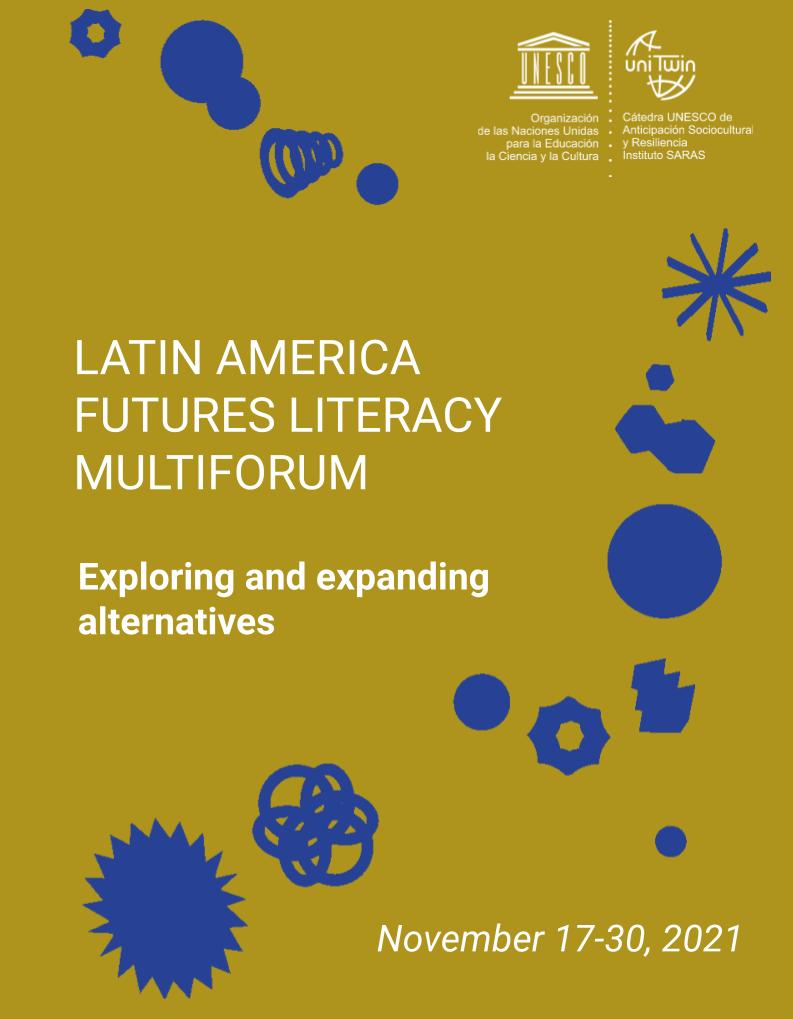
Futures Literacy significantly enhances the ability of individuals and organizations to:
-
- to detect and distinguish repetition and difference – turn change and uncertainty from a liability into an asset
- source and invent images of the future from their own history and context, overcoming poverty of the imagination
- fuel diverse forms of innovation that extend from adaptation and mitigation to transition and transformation
- mobilize anticipatory capacities in a wide range of circumstances
- strengthen resilience and readiness to change by fostering creativity and diversification
As a result, Futures Literacy makes a direct contribution to:
- improving the quality of both what people can see (perception) and do (choices)
- fostering confidence rooted in a better grasp of the relationship between anticipation and certainty/uncertainty
- detecting novelties and fostering experimentation as part of a culture of innovation
- discovering and implementing innovations that advance the Sustainable Development Goals
- incorporating diversity in perception and action by expanding alternatives
- reducing risk by diversifying options and finding opportunities for creativity in uncertainty
- inspiring hope and overcoming despair generated by “poverty of imagination”
- strengthening extended social anticipatory capacities
Organizer:
The UNESCO Chair in Anticipation and Resilience is based at SARAS Institute, Uruguay. Since its creation, its aim has been to contribute to the development and diffusion of the UNESCO Project on Anticipation and Futures Literacy in Latin America and the Caribbean working as a ‘hub’ for conducting cutting-edge action research, training trainers, and engaging with civil society.
Co-Organizers:
- Universidad del Externado, Centro de Pensamiento Estratégico y Prospectiva, Bogotá, Colombia. UNESCO Chair candidate on “Futures Studies for Development”.
- Tecnológico de Monterrey, México. UNESCO Chair candidate on “Anticipatory and Innovative Leadership for Better Futures”.
- Museu do Amanhã, Rio de Janeiro, Brasil, MOTI Foundation, Museum of Tomorrow International, postulating for a UNESCO Chair on Futures Literacy.
- Comisión de Futuros del Parlamento Uruguayo (Uruguayan Parliament Futures Commission). Recently integrated and formally methodologically supported with Futures Literacy Framework.
- Red Uruguay Emprendedor, Uruguay, network fostering the Uruguayan Innovative System.
- UNCuyo, Centro de Estudios Prospectivos de Cuyo, Mendoza, Argentina.
- Universidad Franz Tamayo, UNIFRANZ, Bolivia.
- FUEGOS, Fundación para los Emprendimientos Gastronómicos y las Oportunidades Sostenibles, Food for Change, Manabí, Ecuador.
- Fundación Encuentros del Futuro, Chile.
- Teach the Future México, Brasil y Uruguay.
- RIBER, Red Iberoamericana de Prospectiva. Open foresight community in LAC and Spain.
- The Millennium Project, Futures Studies and Research, Iberoamerican Nodes.
Sponsor:
- Dbox Radio, Radio Program “Future Explorers”, Chile.
Structure of the Forum
The Forum will take place from November 17th to 30th with an event daily. This format, spread over several days, was chosen to give flexibility to the agenda, extend the options for participation of the public, presenters and facilitators of the activities.
The topics are articulated in three axes:
- Innovative ecosystems. Based on the concept of ‘syncretic innovation’ that underpins the UNESCO Chair in Sociocultural Anticipation and Resilience in Uruguay, we seek to reveal, share and seek inspiration from the cultural diversity of LAC communities. The objective is to go beyond narrow conceptions of innovation rooted in the extrapolation of technology – enlarging the sources and objectives of innovation to incorporate different types of knowledge in an articulated and transformative way. The purpose is to make visible and experiment with other modes of innovation that include local knowledge, culture, needs, and identity.
- Futures literacy for decision-makers in public policy areas. This is a key issue in Latin America. Today the need to use the future more effectively is evident, even as there is mounting confusion and conflict around images of the future. Climate extinction, the Covid-19 pandemic, and the cacophony of development models all point to the importance of cultivating greater futures literacy. This series of activities is an opportunity to show the relevance and versatility of augmenting human anticipatory knowledge. The agreement signed between the General Assembly of Uruguay and the UNESCO Regional Office for Latin America and the Caribbean is an excellent precedent.
- Sustainable Development Goals. This is a cross-cutting, multiple, interrelated agenda that also requires specificity of context and action. Futures literacy contributes to grasping the relationships that connect macro and micro, emergent and established elements of the present, facilitating the discovery and invention of virtuous synergies that intertwine various objectives in the same action/activity.
Participation
The Forum’s target participants encompass a wide range of stakeholders, including: senior government decision-makers; representatives of multilateral institutions; donors; NGOs, academics, think-tanks, foundations, private sector and philanthropic organizations; young leaders, researchers and social innovators; and existing and new UNESCO Chairs.
Program
“Re-imagining Education in a Learning-Intensive Society”
Organized by: Tecnológico de Monterrey
November 17 from 5:30 p.m. to 9 p.m. (GTM-3)
In the current context of changes, understanding, accompanying, and influencing the ‘terms of change’ (that is, in the permanent creation of novelty) becomes a key skill. This has to do with anticipatory capacities and competencies linked to learning, creativity, and resilience. In this workshop, we propose to experiment exploring new creation of meaning and meanings in a “learning-intensive society” (Learning Intensive Society, Miller, 2004).
Workshop registration: https://bit.ly/3Hh8vAy
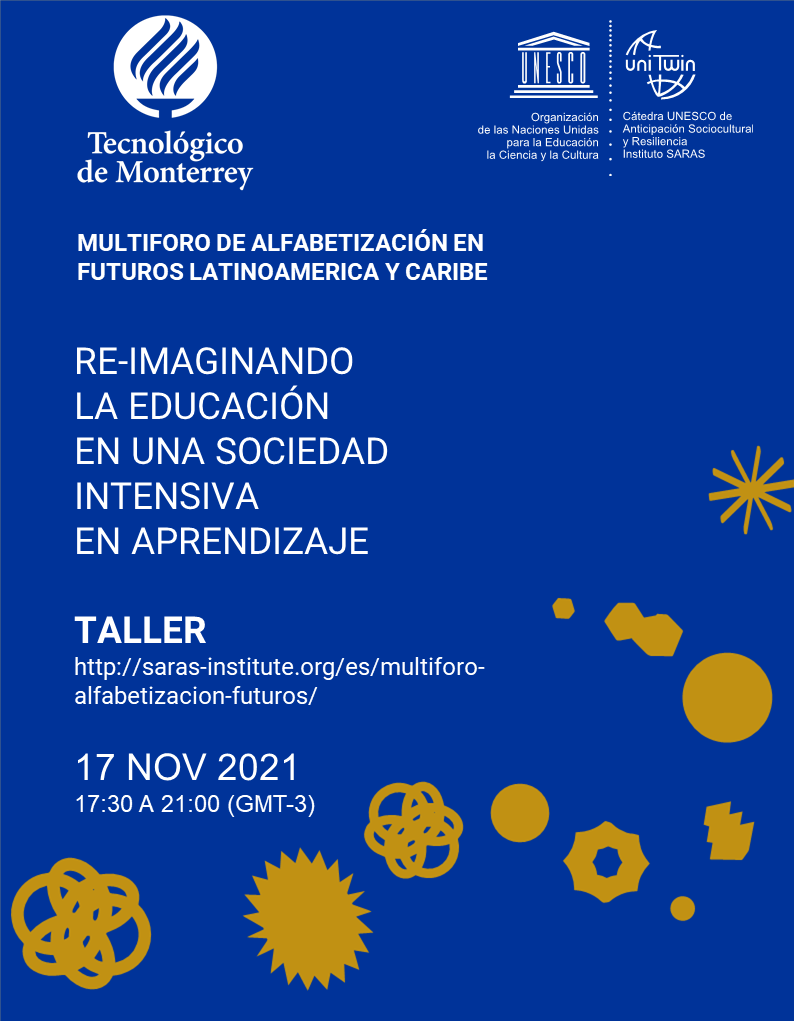
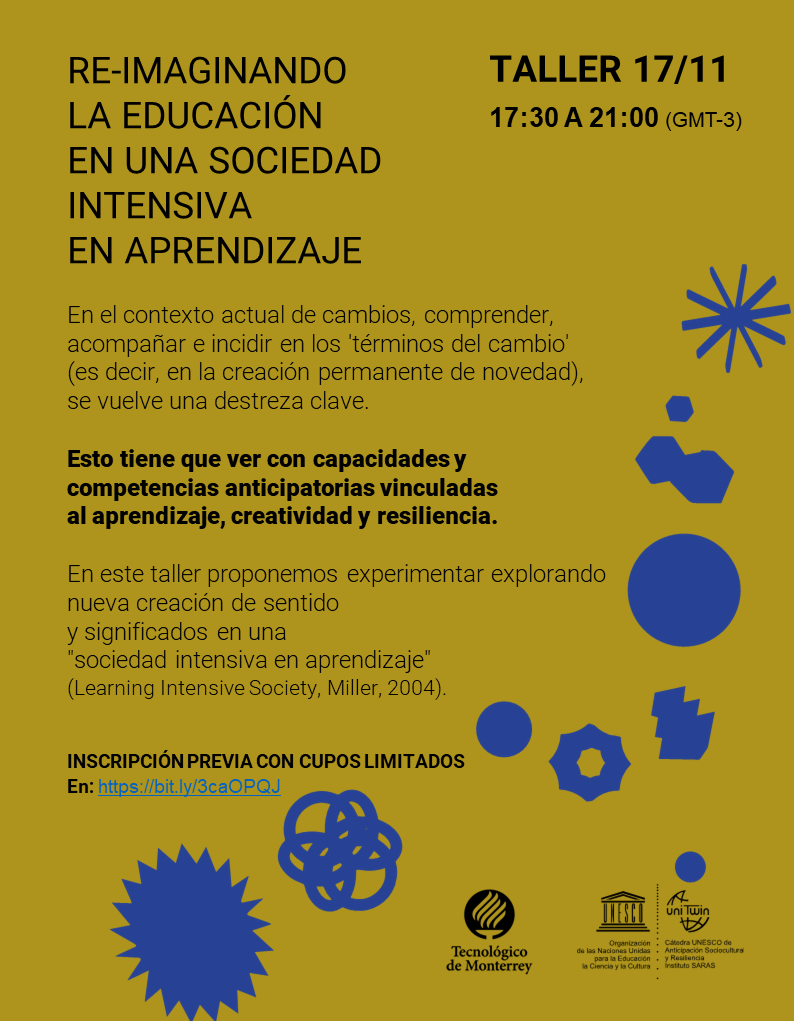
“Diversifying, Democratizing and Decolonizing the Future”
Organized by: MOTI – MUSEUM OF TOMORROW
November 22 from 9 a.m. to 11 a.m. (GMT-3)
Creativity, Science, Sustainability, Futures.
Experiences panel on how to use literacy in the ‘use of the future’ as a ‘boundary object’.
Registration for the presentation: https://bit.ly/3FeW2vu
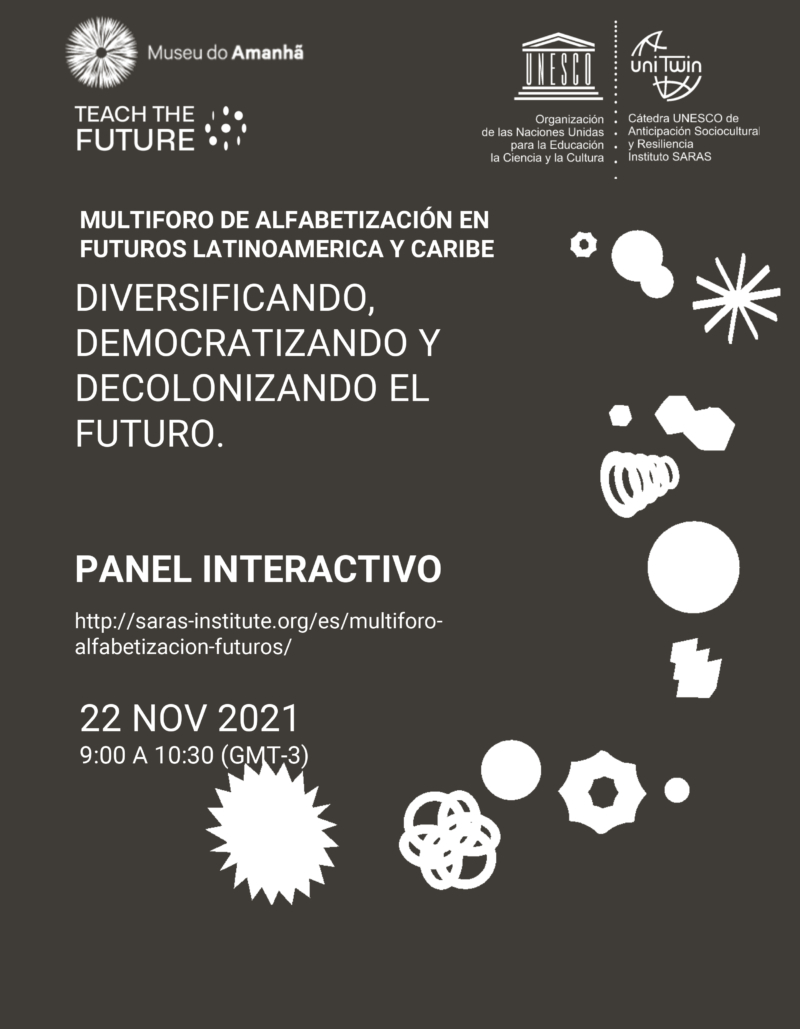
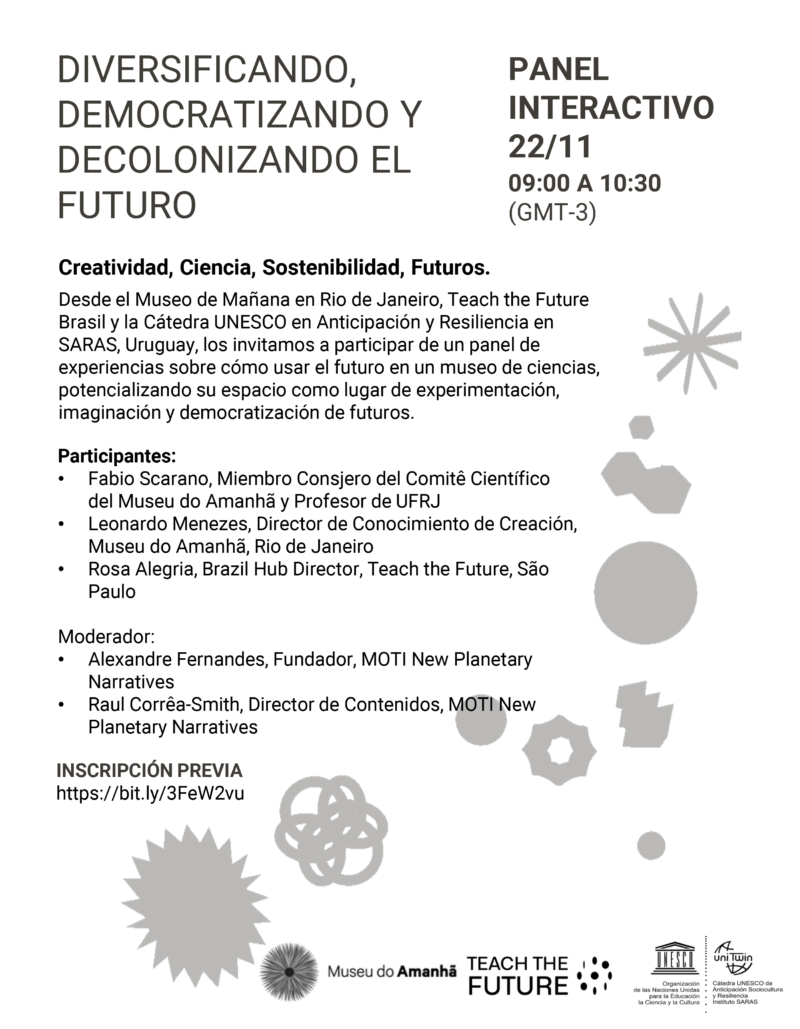
“The Uruguayan entrepreneurial ecosystem as a systemic attractor in the framework of the transformations of a 4.0 world”
Organized by: Uruguay Emprende
In the context of disruptive changes, a process of knowledge creation based on collective intelligence in the key of futures is invited. An exercise that will allow us to explore expectations, opportunities, challenges, enablers, and inhibitors in our ecosystem by imagining it as an attractor of systemic change within the transformations that are already taking place today.
Workshop registration: https://bit.ly/3kDgRZK
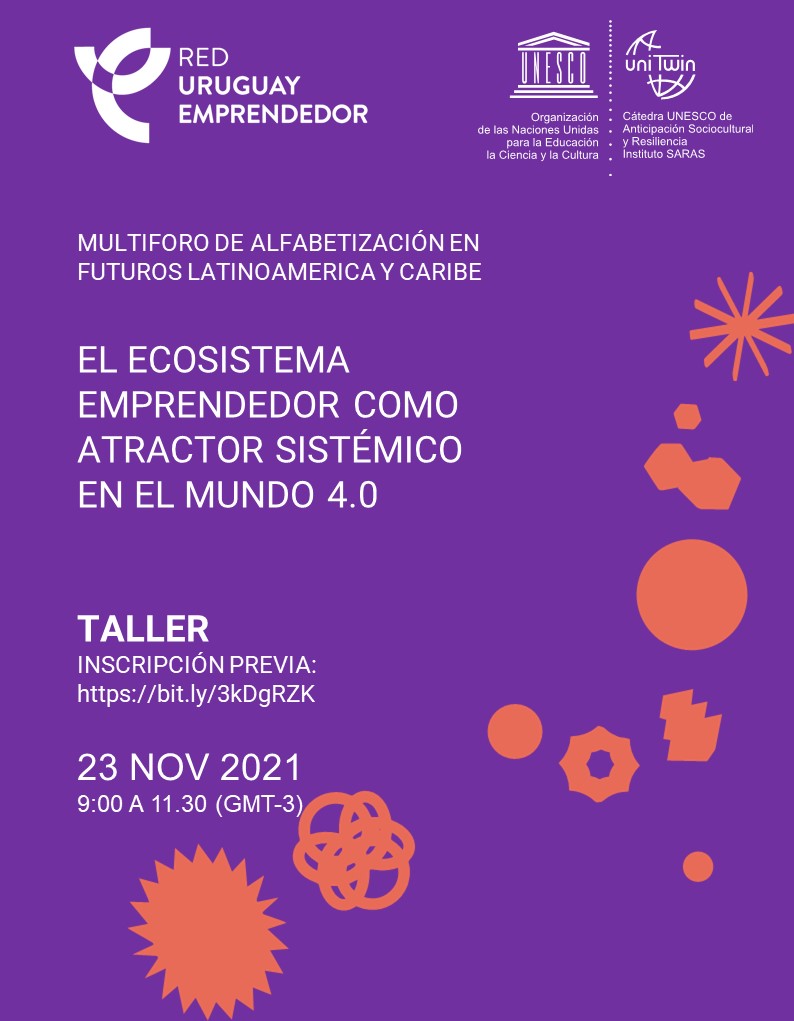
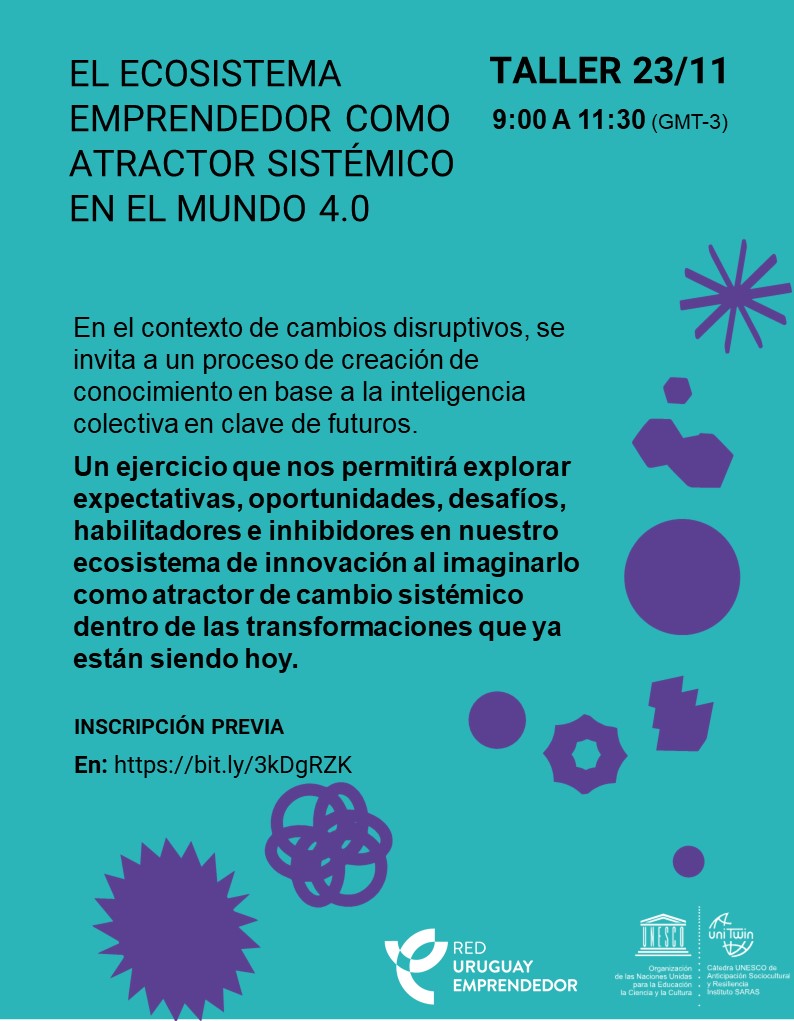
“Uses of futures in LATAM: Dialogues among perspectivists”
Organized by UNCUYO
November 25 from 17 to 19hrs. (GMT-3)
Transforming the Future. Anticipation in the XXI Century – Comments on the Spanish translation of the book that includes the theoretical and methodological framework and some applied cases. The Global Anticipation and Futures Literacy Network define itself as a ‘Movement’. How can this ‘movement’ of literacy in the ‘use of the future’ intertwine with other initiatives taking place?
Registration for the discussion: https://bit.ly/3cejRaj
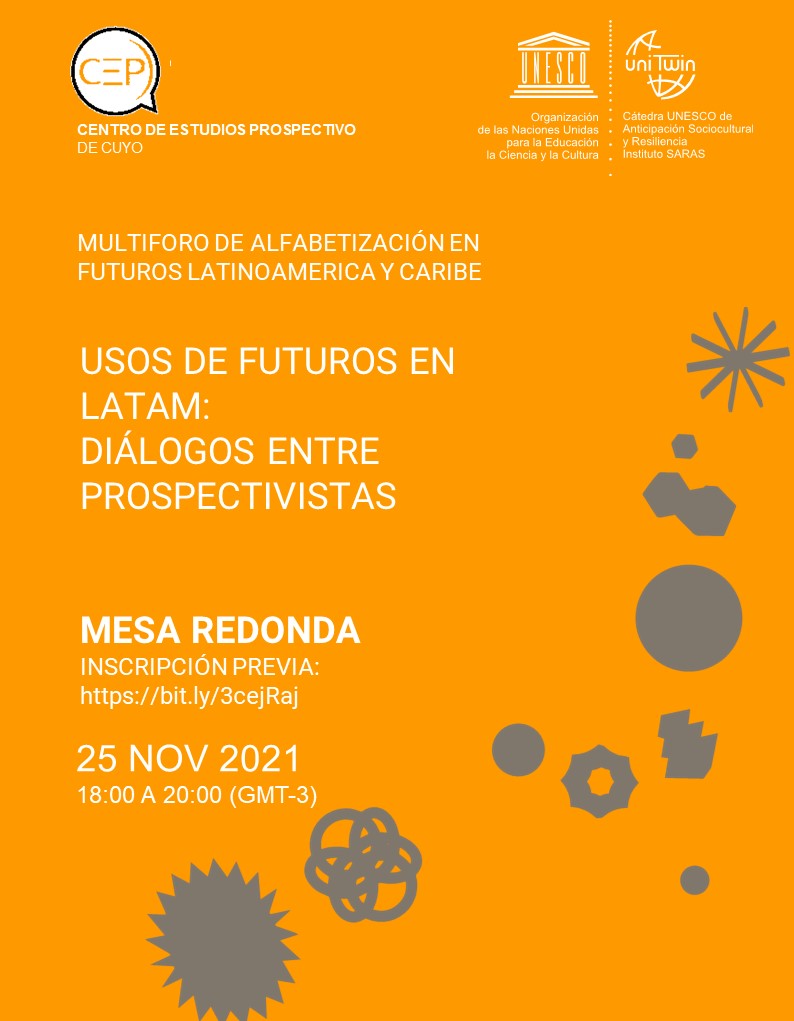
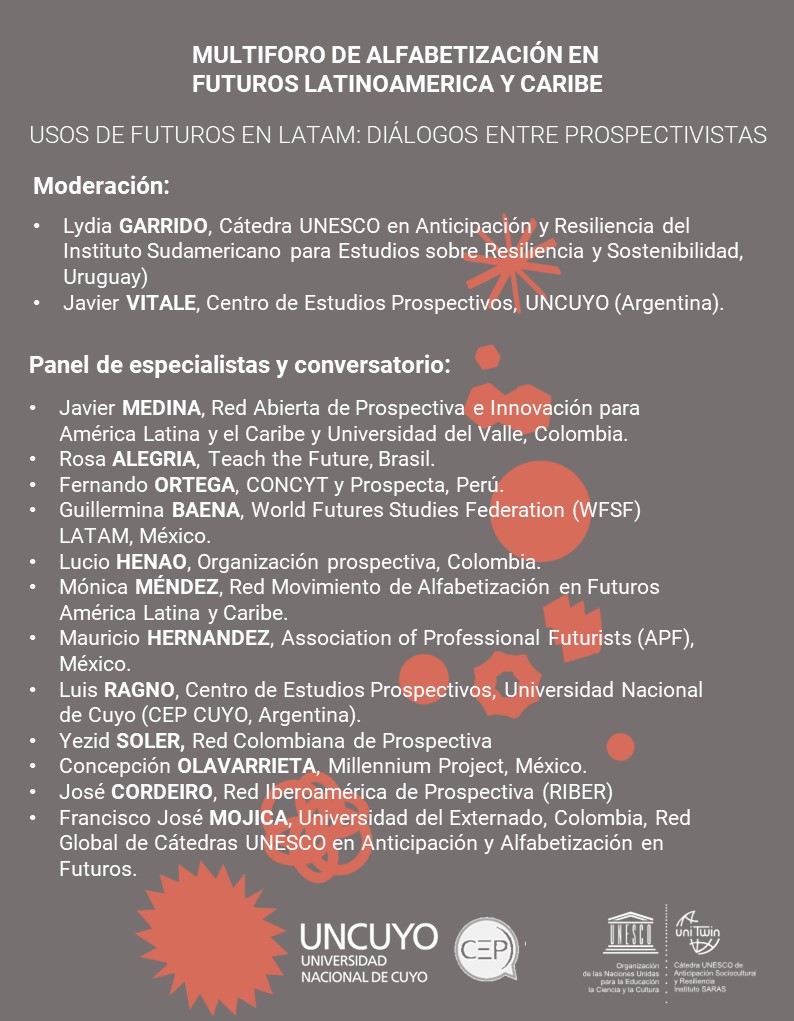
“Inhabiting Creative Futures. Development of abilities and skills”
Organizers: “Teach the Future Mexico”
Friday, November 26, 2:00 p.m. to 4:00 p.m. (GMT-3)
In a context of continuous creation of novelty, creativity is an opportunity and a challenge. Inhabiting creativity is embodying the potential to expand horizons. This is linked to anticipatory capacities and competencies that in turn are directly related to learning, reflexivity, and resilience.
In this workshop, we propose to experiment by exploring new creations of meaning and meanings that the future throws at us in the face of so many changes and challenges.
Facilitates: Alethia Montero, Mexico
Registration: https://bit.ly/3r9F9i9
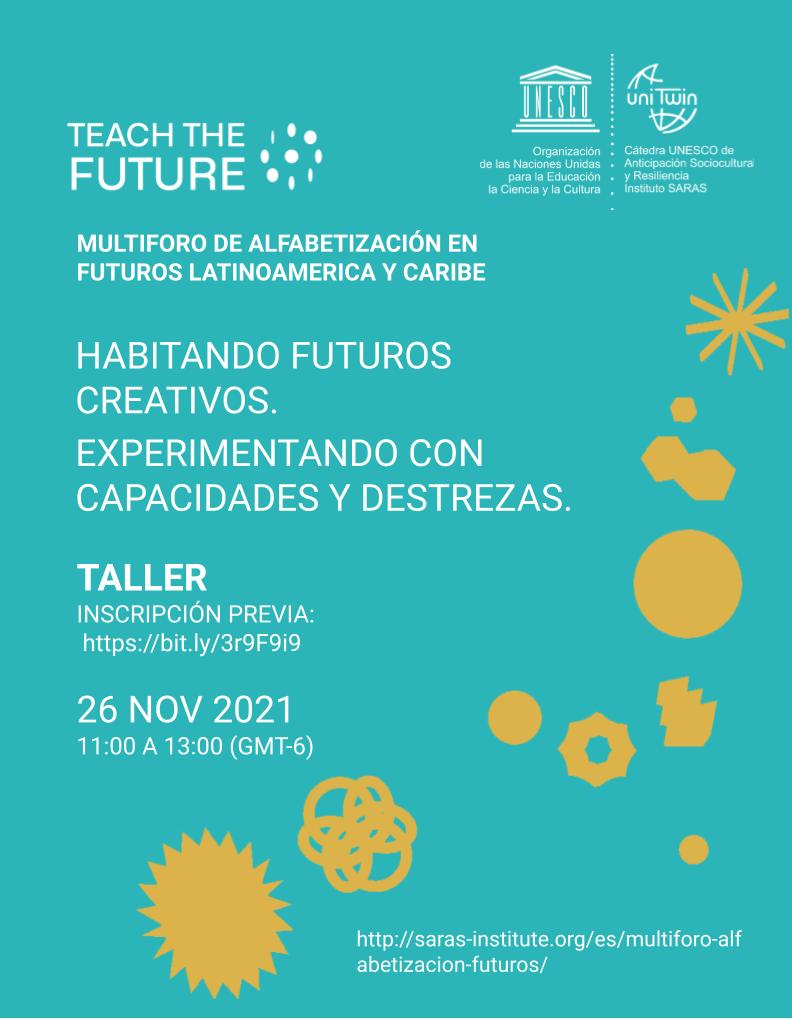
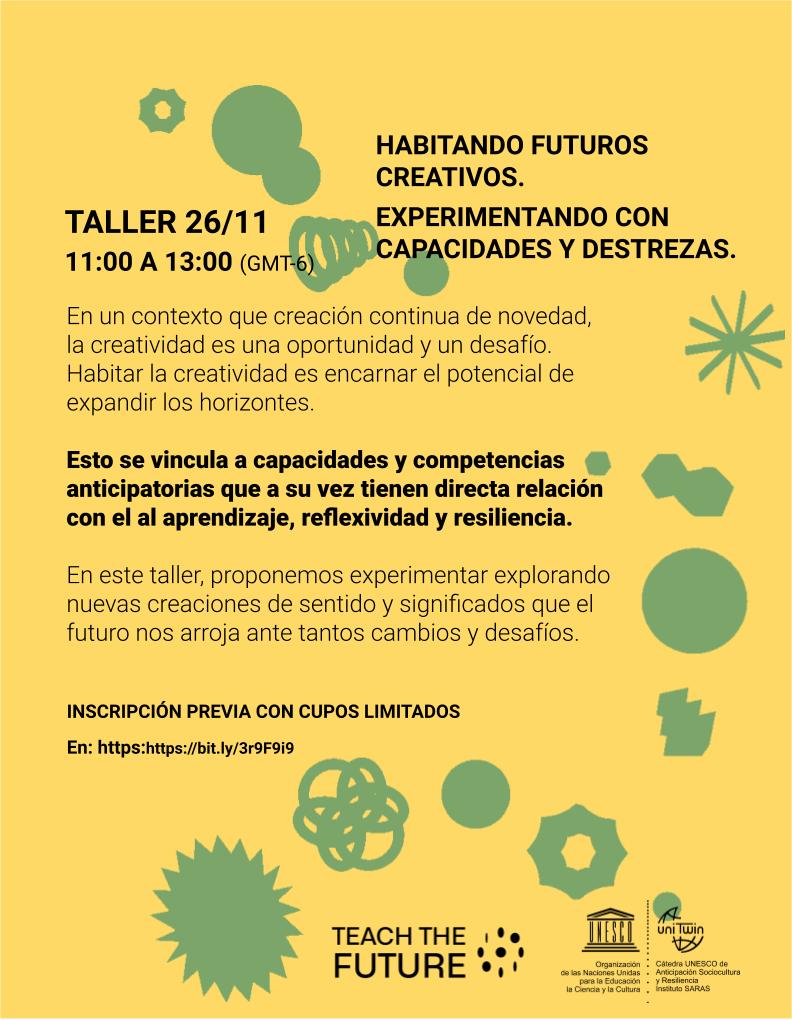
“Reimagining food: generating creative and sustainable alternatives with local identity”
Organized by: FUEGOS
Monday, November 29 11:00 a.m. to 1:00 p.m. (GMT-3)
Exchanging learnings, experiences, and looking for alternatives from creativity to rethink issues related to food, sustainable production and consumption from a transformative and responsible anticipation approach.
Special Guests: Estefanía SIMON SASYK, Leader of projects in regional development at BCC Innovation, Spain. Stephen SHERWOOD, Regenerative Agriculture Farmer / Teacher / Researcher, Urkuwayku Farm, EkoRural, Wageningen University, The Netherlands. Vicente PLATA, Officer in Charge FAO Uruguay. Case Presentation: Ana LOBATO, FUEGOS Foundation Gastronomic Laboratory Coordinator. Moderator: Lydia GARRIDO, UNESCO Chair in Anticipation and Resilience of the South American Institute for Studies on Resilience and Sustainability, Uruguay. Orazio BELLETTINI, FUEGOS, Food for Change, Ecuador. Michelle FRIED, Iche, Food School, FUEGOS, Food for Change, Ecuador.
Registration: https://bit.ly/3xhqUsj
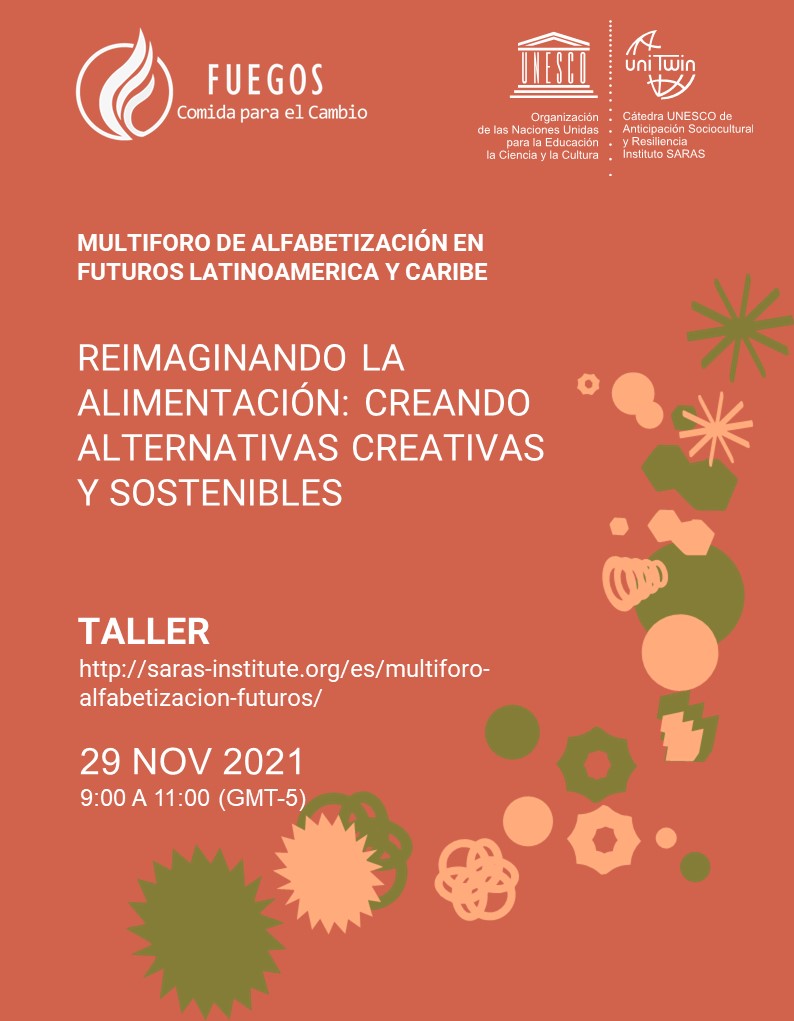
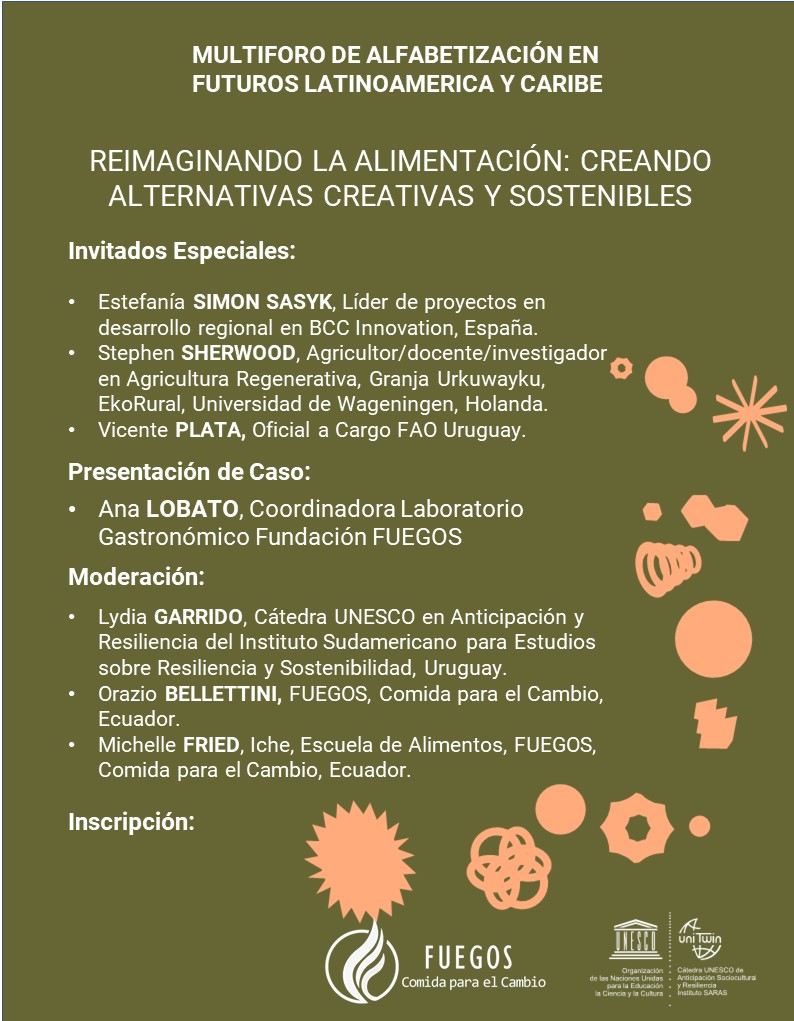
“Anticipation in decision making. Rethinking the 21st-century company”
Organized by: Universidad del Externado Colombia
November 29 from 7 to 10 p.m. (GMT-3)
In the context of changes in this era and change of era, it becomes essential to develop skills to deal with uncertainty and surprise. The Literacy focus on the ‘use of the future’ provides us with frameworks and instruments more appropriate to this context.
Workshop registration: https://bit.ly/3Hh8vAy
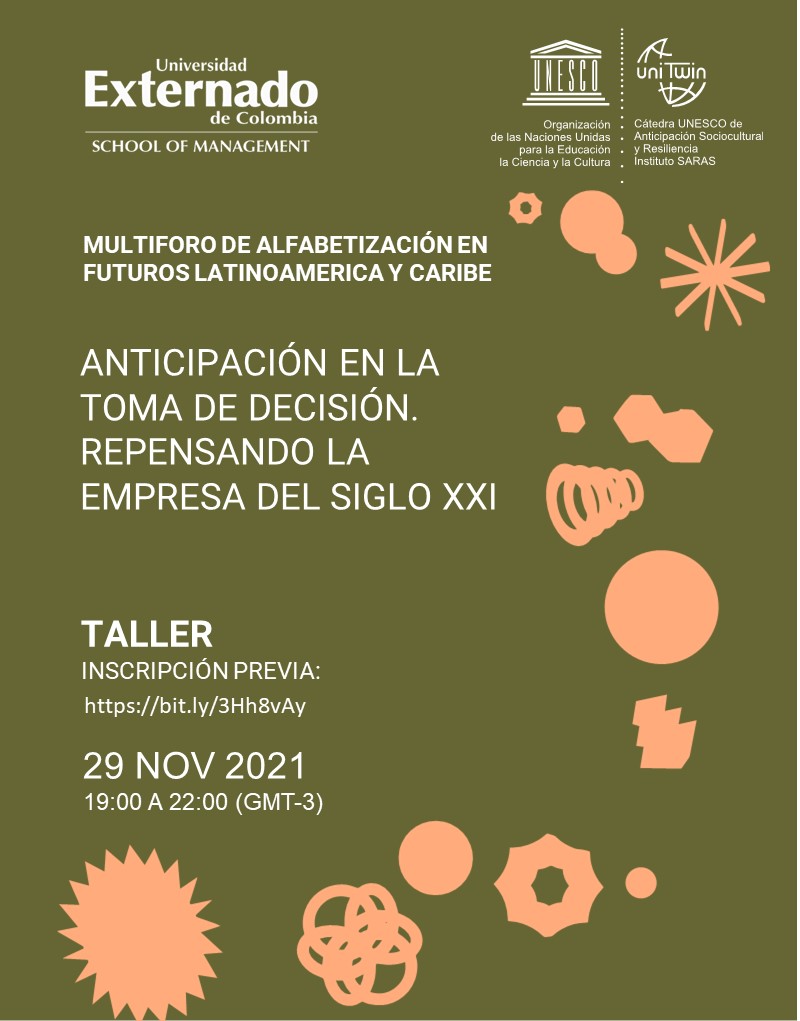
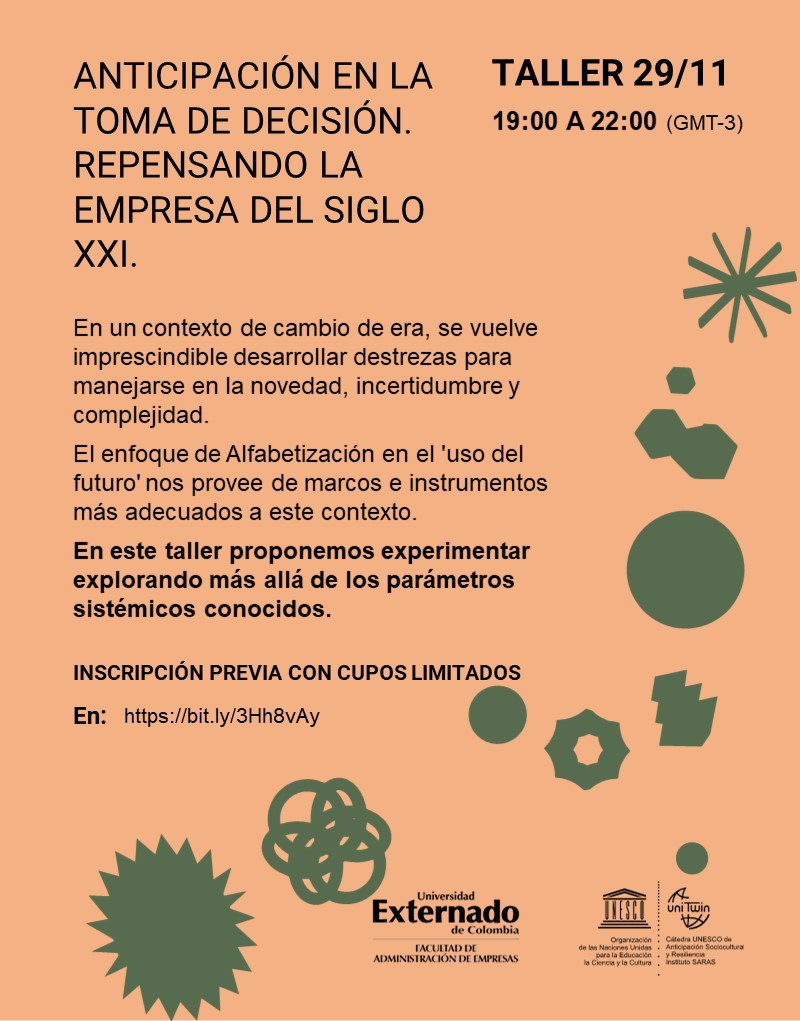
“The Future in Parliaments. The Futures Literacy approach and its relevance in Decision Making”
Organized by: Uruguay Parliament Futures Commission
Tuesday, November 30 11:00 (GMT-3)
The world is immersed in a context of change that requires adequate analysis to deal with permanent novelty, uncertainty, and complexity.
The Futures Literacy approach provides a conceptual and practical framework to improve the quality of the information in decision-making.
Registration: https://bit.ly/32mQH77
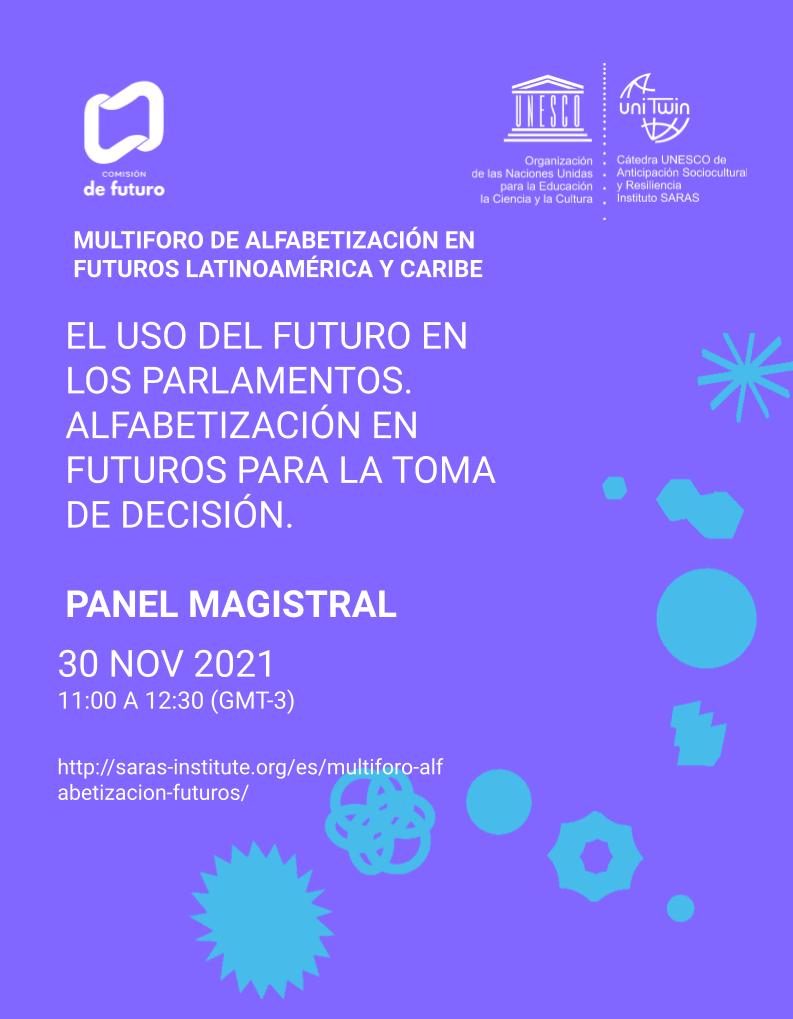
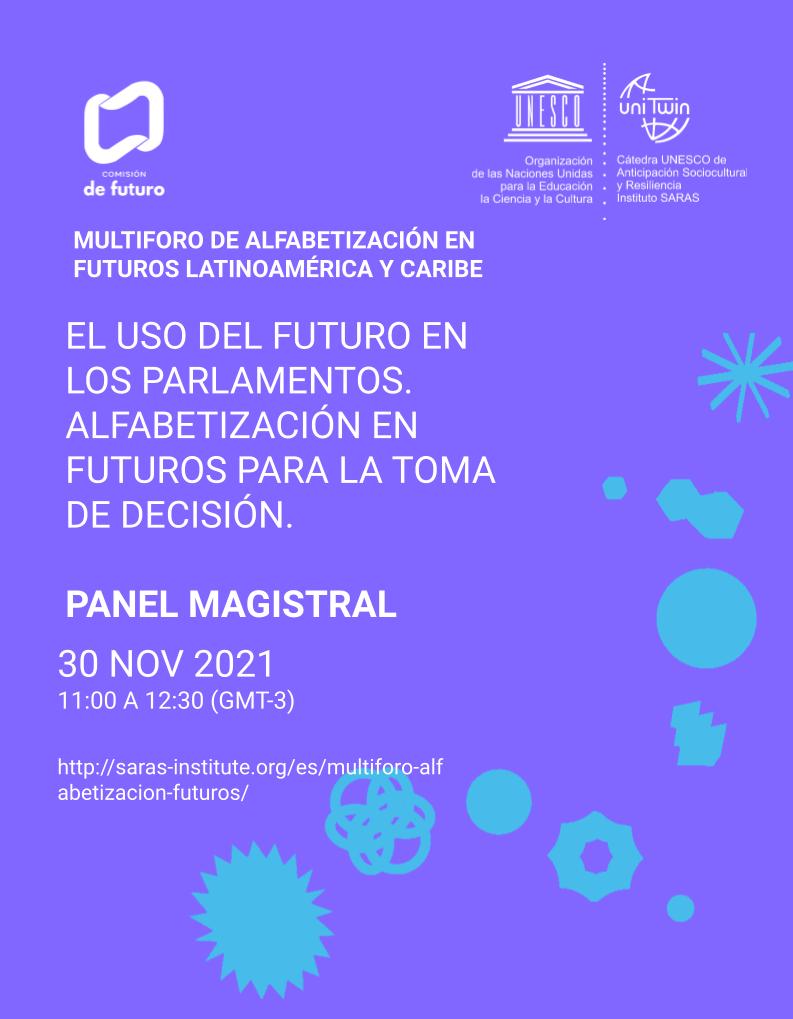
For more information about the UNESCO Chair in Sociocultural Anticipation and Resilience click here
CONTACT: Lydia Garrido Luzardo
lydiagarrido@gmail.com
